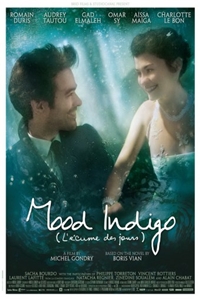 Mood Indigo
Mood Indigo
Starring Romain Duris, Audrey Tautou, Gad Elmaleh, and Omar Sy
Directed by Michel Gondry
Rated NR
Run Time: 94 minutes
Genre: Drama/Fantasy
Opens August 1st
By Eric Forthun of Cinematic Shadows
Mood Indigo is a bubbly film of imagination and surrealism, a zany creation from the mind of Michel Gondry. He's a breathtaking filmmaker that can capture the wondrous and quiet moments of everyday life, mixing them together in a cluster of contorted mise-en-scene and emotionally backed characters. It's remarkable. His most famous work, Eternal Sunshine of the Spotless Mind, is one of the great films of the 2000s, and here he creates a similarly realized tale of love and the heartbreak inherent with such an emotion. The film centers on Colin (Romain Duris), a wealthy, inventive bachelor that lives in a strange apartment in France. A tiny mouse man maneuvers around his house at whim while Colin's hired chef, Nicholas (Omar Sy), cooks meals for him, teaches him how to dance, and basically acts as a surrogate friend. Colin has crafted various appliances, like the pianocktail, a piano that brews a specific liquor based on your note selection.
His best friend, Chick (Gad Elmaleh), tells him about this new woman he just met, insisting she's not American because Colin cannot stand them. Sure enough, she is, as Colin follows Chick to a party for his friend's dog. At this gathering he meets Chloé (Audrey Tautou), a beautiful young woman that finds all of Colin's miscues endearing. She connects with him intellectually and they strike up a conversation that leads to a date. They ride around in a crane-controlled cloud and begin to fall in love. What a strange set-up for a narrative. But the film's first half is mostly built around this sense of world building, creating an environment that looks remarkably similar to our notions of reality but takes a few liberties with physics and chemistry. Gondry's film lacks conventional sense in its first half in terms of the external environment, yet the most important foundation remains: strong characters.
Colin is a driven man dedicated to living happily with Chloé. She falls sick and he does whatever it takes to save her life, investing in odd medical practices and taking up a cumbersome, laborious job to earn extra money to provide for her. He's never worked a day in his life, always relying on what can only be described as a hefty inheritance that allows him to live without worry. Chloé never seems to hold a job either, and this establishes a sense of immaturity and irrationality in the characters. Gondry does something unique with the script and allows for the story to focus entirely on emotion in its second half. By setting up these characters and making them imperfect, he allows the audience to relate to their love and see how it grows. The film is not easy on these central characters, demonstrating unrest in Chick and his girlfriend while emphasizing the hopelessness of Colin as his wife withers away before his eyes. At times, the film acts as a sly, indirect metaphor for the effects of cancer, and that resonates strongly.
What works remarkably about Mood Indigo is how visual representation advances the story and uniquely engages the characters. There's subtlety throughout most of the feature due to the rapidly changing visual landscape and language. Take, for instance, the transformation in color scheme that transpires over the narrative. Once Chloé falls sick, the film relies on dark textures and confined spaces, avoiding sweeping outside shots and jump cuts that the first half grandly emphasized. The last fifteen minutes have a simple change that works vastly for the narrative and the way love affects an individual. The performances are affectionate and nuanced, with Duris in particular showcasing Colin's inner turmoil with composure and subtlety. Tautou is always an enjoyable presence on screen, and she commands the film's second half as the story utilizes her full potential. But perhaps most importantly, if all of these strange quirks haven't convinced you, I'll say this: there's nothing else out in cinemas like Mood Indigo, and that alone makes it worth seeing.









